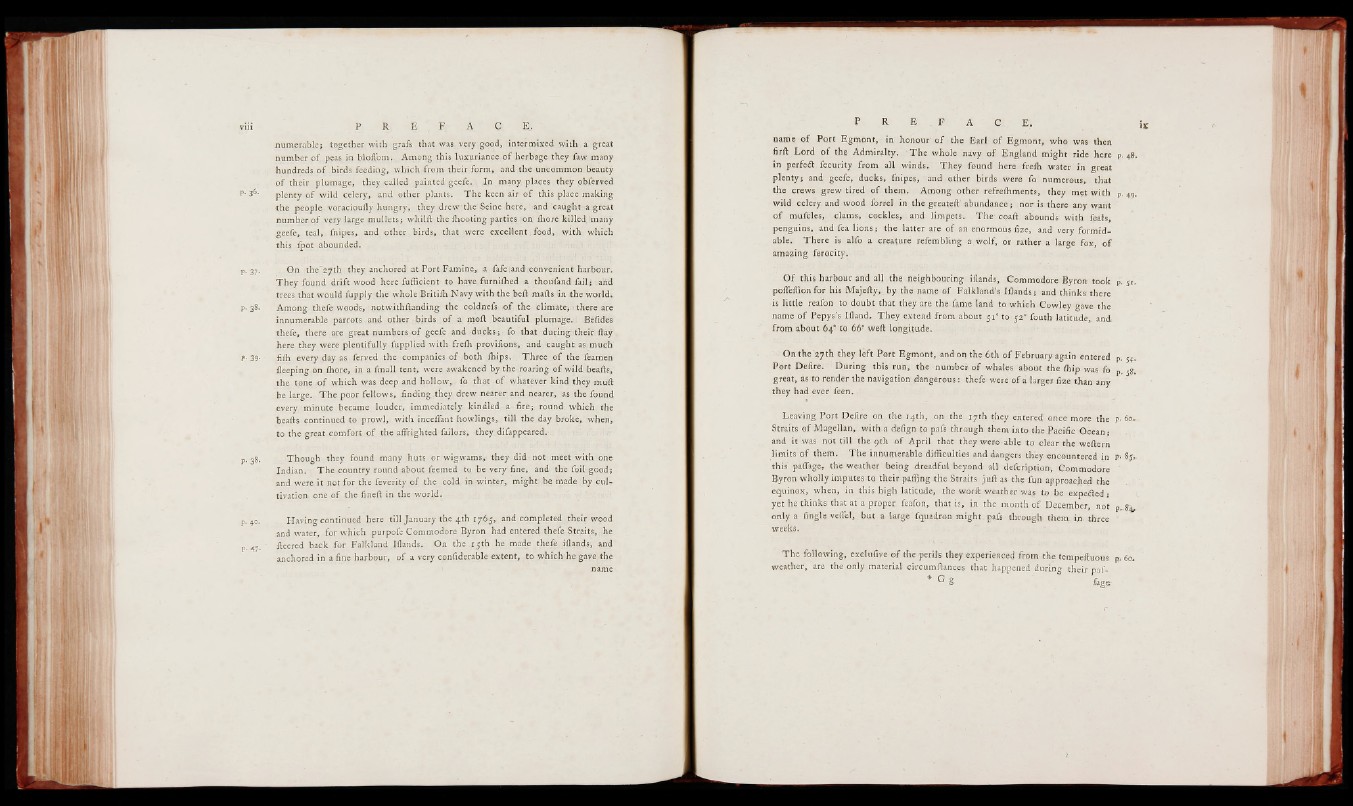
numerable; together with grafs that was very good, intermixed with a great
number of peas in bloffom; Among this luxuriance of herbage they faw many
hundreds of birds feeding, which from their form, and the uncommon, beauty
of their plumage, they called painted geefe. In many places they pbférved
P’ 36* plenty of wild celery, and other plants. The keen air of this place making
the people voracioufly hungry^ they drew the'Seine here, ' and caught a great
number of very large mullets; whilft the ihooting parties on ihoré killed/many
geefe, teal, fnipes, and other birds, that were excellent, food, with which
this ipot abounded.
p. 37. On the~27th they anchored at Port Famine, a fafeiand convenient harbour.
They found driftwood here fufficient to have furniihed a thoufand fail; and
trees that would fupply the whole Britiih Navy with the beft mails in the world,
p* 38. Among thefe woods, notwithftanding the coldnefs of the climate; there are
innumerable parrots and other birds of a moil beautiful plumage. Befides
thefe, there are great numbers of geefe and ducks ; fo that during their ftày
here they were plentifully fupplied with freih provifions, and caught as much
P-39* fiih every day as ferved the companies of both ihips. Three , of thè feamen
ileeping on ihore, in a fmall tent, were awakened by the roaring of wild beaits,
the tone of which was deep and hollow, fo that of whatever kind they muft
be large. The poor fellows, finding they drew nearer and nearer, as the found
every minute became louder, immediately kindled a fire; round which the
beails continued to prowl, with inceffant bowlings, till the day broke, when,
to the great comfort of the affrighted fiailors, theydifappeared.
p. 38. Though they found many huts or wigwams, they did not meet with one
Indian. The country round about feemed to be very fine,, and thè foil good;
and were it not for the feverity of the cold in winter, might be made by cultivation
one of the fineil in the wor^d.
p. 40. Having continued here till January the 4th 1765, and completed their wood
and water, for which purpofe Commodore Byron had entered thefe Straits, he
P. 47. fteered back for Falkland, Iflands. On the 15th he made thefe iflandsy and
anchored in a fine harbour, of a very confiderable extent, to which he gave the
name
name of Port Egi^iont, in honour' of the E^rl of Egmont, who was then
firft Lord of the Admiralty. The whole navy of England might ride here p. 48.
in perfect fecurity from all winds. They found here freih water in great
plenty; and geefe, ducks, fnipes, 1 and other birds were fo numerous, that
the crews grew tired of them. Among other refreihments, they met with p. 49.
wild celery and wood forrel in the greateft abundance; nor is there any want
of muffles, clams, cockles, and limpets. The coaft abounds with feals
penguins, and fea lions; the latter are of an enormous fize, and very formidable.
There is alfo a creature refembling a wolf, or rather a large fox, of
amazing ferocity.
Of this harbour and all the neighbouring iflands, Commodore Byron took p 51.
pofleflionfor his Majeily, by the name of Falkland’s Iflands; and thinks there
is little reaibn to doubt that they are the fame land to which Cowley gave the
name of Pepys’s Ifland. They extend from about 510 to 520 fouth latitude and
from about 64° to 669 weft longitude.
On the 37th they left Port Egmont, and on the 6th of February again entered p. 54v
Port Defire. During this run, the number- o f whales about the fhip was fo p sg-
great, as to render the navigation dangerous: thefe were of a larger fize than any
they had ever feen.
Leaving Port Defire on the 14th, »on the 17th they entered once more the p.- 6o~
Straits of Magellan, with a defign tp pafs through them into the Pacific Ocean •
and it was not till the 9th of April that they were-able to clear the weftern
limits of them. The innumerable difficulties and dangers they, encountered in P* $5-
this paffage, the weather being dreadful beyond all defeription; Commodore *
Byron wholly imputes to their paffing the Straits juft as thefijn approached the
equinox, when, in this high latitude, the worft weather wa,s to be expelled;
yet he thinks that at a proper, feafon, that is, in the month of December, not
only a fingle veffel, but a large' fquadron might pafs through them, in three
weeks.
o' . i -- --- - j — i------------- v ;
weather, are the only material circumftances that happened during their paf-
* f t B fege?
I !j